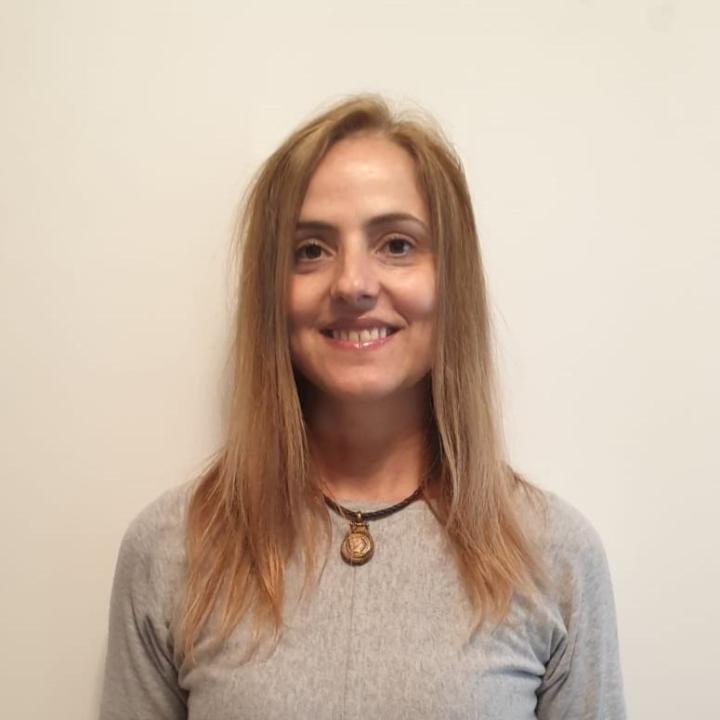Dr Cristina Esteves on adult stem cells in domestic species
Understanding the biology of adult stem cells, their antimicrobial and tissue repair potential, and the importance of student supervision.

Dr Cristina Esteves is a Senior Research Fellow at the Roslin Institute where she studies the biology of adult animal stem cells, their function in the body and potential use as antimicrobials and repair tools to combat infections, particularly those involving antibiotic resistance. In this interview, she talks to MSc Science Communication student Elise Cutforth on her research, teaching and her fantasy dinner party.
What is your background?
I am Portuguese and I started out studying biology and biochemistry in my home country to PhD level. Towards my PhD, I had the opportunity to do research at the University of Wisconsin. Then, I returned to Portugal as an assistant professor and I was awarded a Fellowship to work at the University of Iowa. After that, I moved to Scotland, and started working at the University of Edinburgh and the Roslin Institute.
Why did you want to become a scientist?
I always liked science, even when I was small. As I grew up, I became fascinated by cells and I have been lucky enough to work with them ever since. After Portugal joined the EU, opportunities in science became more numerous and I benefited from these a lot.
Can you describe your work in a nutshell?
I work with adult stem cells from different domestic species including horses, dogs, pigs and cattle. The cells I am looking at are called mesenchymal stem or stromal cells, which exist around our blood vessels. This means they are pretty much everywhere in our bodies and are involved in lots of functions including differentiation into other relevant cell types, such as adipose, bone, cartilage and muscle cells. They also participate in repair and regeneration, they promote blood vessel formation and communicate with the immune system. Recently they were discovered to produce antimicrobials to fight infection.
Lately, I have been interested in using cell preparations with repair and antimicrobial potential. Our aim in the future is to find ways to use them to help fight infections, especially those involving antibiotic resistance.
What’s also interesting is these cells are involved in shielding microorganisms such as those that cause tuberculosis. I am seeking to understand how they work in the body, how they communicate with the immune system, and how they can be manipulated.
What challenges do scientists face?
I think if you talk to different scientists they will say the same: it’s a challenge getting funding. I think at the same time it’s an interesting challenge because it makes you think innovatively and can force you to try different things.
Teaching students in the lab is also a challenge, in a good way. Everyone is unique and different and therefore accommodating for their personalities can be very interesting. Indeed, it’s rewarding knowing you are contributing to their progress and even shaping their future, so it’s definitely a positive challenge.
Are you involved in any public engagement?
We are all involved in one way or another in public engagement, just by talking to friends, family and neighbours about our work. I have been involved in activities at the Institute too, communicating with students and inviting them to the Institute. My favourite activity involves writing letters to students overseas. This is actually in my mother tongue of Portuguese and it is really interesting what the students ask and say.
Have you noticed a difference in the prevalence of public engagement recently?
There has been a huge difference since a decade ago. I think people are more interested in knowing about what we do and I think it’s important that they see how useful it is. Covid-19 is not the only example of the utility of science, challenges such as climate change demonstrate how necessary it is. Now, we see scientists on television much more regularly and I think that is key in showing how science can solve the big problems.
Do you have any advice for aspiring scientists?
I think that they need to have a wise approach. Science is full of opportunities, and the ability to match what they are interested in with where they can find a job is vital. I see it more and more in the students on PhD courses, that they want to know where it can take them after their degree. Gaining knowledge is fantastic but it is also important to carefully choose your area.
If you weren’t a scientist, what would you be?
I would probably try to work in the pharmaceutical industry. I liked many different things as a teenager but I was attracted to the application of science in that industry.
Teaching is also something that is always really relevant and is often overlooked. Contributing to the knowledge of others is so important, the more educated we are, the more able we are to deal with problems.
Who would you invite to your fantasy dinner party?
Probably normal people. I was never attracted to celebrities but I would love to sit down with anybody from a culture I am not familiar with – especially if I got the chance to taste their home country’s food.


